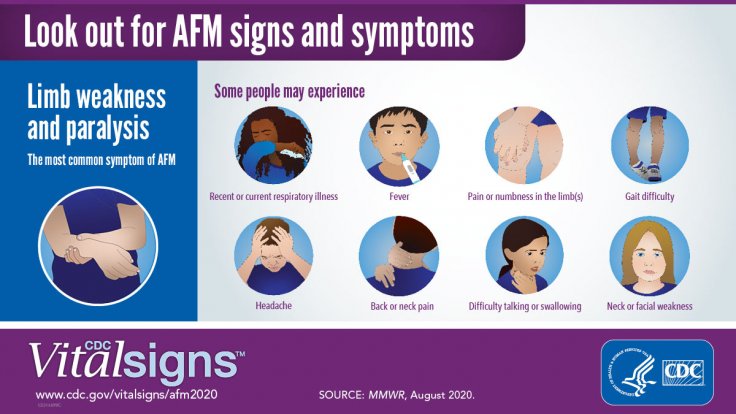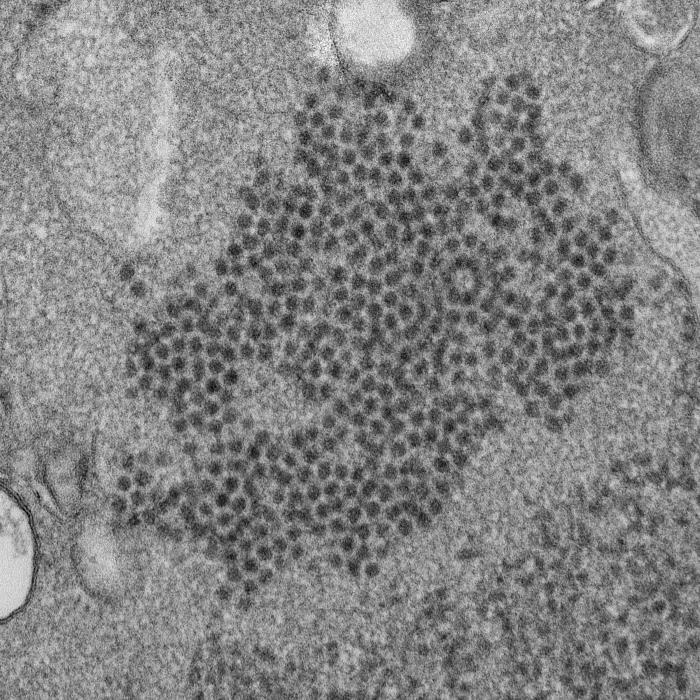Amid the Coronavirus pandemic, another disease might be lurking in the shadows. The U.S. Centre for Disease Control and Prevention (CDC) has warned of a potential outbreak of life-threatening polio-like Acute Flaccid Myelitis (AFM).
The disease, which is rare but affects children the most, is a neurological condition. AFM affects the nervous system and weakens muscle reflexes in the body and causes paralysis. As per the CDC, the virus peaks every two years between August and November.
Causes and Symptoms
While the exact cause of the condition is unknown, medical experts believe Enterovirus, especially EV-D68, may be responsible. Another enterovirus EV-A71 has also been linked to the disease. The CDC has urged the parents to immediately seek medical attention if children develop any of the common symptoms including fever, pain or numbness on the limb, difficulty breathing, facial paralysis, slurred speech, headache, back or neck pain and difficulty swallowing. Some of the patients, mostly below five years of age, might have had a history of respiratory illness.

"AFM can progress rapidly over the course of hours or days, leading to permanent paralysis and/or the life-threatening complication of respiratory failure in previously healthy patients, so delays in care can be serious," the CDC said in a media release.
The last time, such an outbreak was observed was in 2018 when 238 cases were reported across the U.S. with Texas reporting the most (31). In total, 633 cases of AFM have been reported since it was first noticed in 2014. The CDC added that 35 percent of the patients were not admitted to the hospital immediately during the 2018 outbreak. Delay in medical attention could cause permanent paralysis and respiratory failure. It has also urged the medical professionals to take steps so that recognizing the condition early could be helpful.

"As we head into these critical next months, CDC is taking necessary steps to help clinicians better recognize signs and symptoms of AFM in children. Recognition and early diagnosis are critical. CDC and public health partners have strengthened early disease detection systems, a vital step toward rapid treatment and rehabilitation for children with AFM," said Dr Robert Redfield, the Director of the CDC.
Impact of COVID-19 on AFM
While there is no cure and possible prevention for AFM, the CDC has suggested that preventive measures for any viral infection can be undertaken. Preventive measures include:
However, with the COVID-19 pandemic underway, the impact of that on AFM is unknown. With people already taking preventive measures for Coronavirus, some experts believe that impact of AFM could be less since schools are closed and wearing a mask has become the new normal.
But there are concerns as well. Some experts have also warned that due to the COVID-19 pandemic, cases of AFM might not be recognized. As per CDC statistics of 2018, 98 percent of the AFM patients needed hospitalization and 54 percent were admitted to the intensive care unit (ICU) with 25 percent requiring a ventilator.
"We are concerned that in the midst of a COVID pandemic, that cases might not be recognized. Or we're concerned that parents might be worried about taking their child to the doctors with something as serious as limb weakness," Dr Thomas Clark, a CDC official overseeing AFM surveillance said.
Dr Clerk, who is also the Deputy Director of CDC's Division of Viral Diseases, has urged the clinicians to refer to the CDC Vital Signs and adjust practices accordingly.
"All clinicians should remain vigilant for AFM and promptly evaluate patients. During the COVID-19 pandemic, this may require adjusting practices to perform clinical evaluations of patients by phone or telemedicine. However, clinicians should not delay hospitalizing patients when they suspect AFM," he added.








